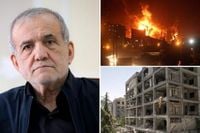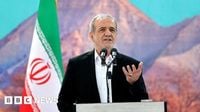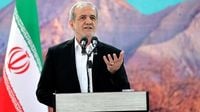In a dramatic escalation of hostilities in June 2025, Iranian President Masoud Pezeshkian was reportedly injured during an Israeli airstrike targeting a secret underground facility in Tehran. According to multiple reports from Iranian state-linked agencies, including the Fars News Agency (FNA), six bombs struck the entrances and ventilation systems of this facility on June 16, coinciding with a high-level emergency meeting of Iran's Supreme National Security Council, which Pezeshkian attended.
The Supreme National Security Council, Iran's highest decision-making body after Supreme Leader Ayatollah Ali Khamenei, convened in this underground complex amid a 12-day conflict between Iran and Israel. The Israeli strikes were part of a larger campaign launched on June 13, aimed at crippling Iran's nuclear and military infrastructure, which Israel claimed was necessary to halt Tehran's alleged nuclear weapons program.
During the attack on June 16, the bombs reportedly sealed off all six main entry and exit points and disabled the ventilation system, also cutting the power supply to the facility. Despite these extreme measures, President Pezeshkian and other top officials managed to escape through an emergency shaft, although Pezeshkian sustained minor leg injuries in the process. Videos circulated on social media showed repeated shelling in northwestern Tehran during the conflict, underscoring the intensity of the Israeli bombardment.
The precision of the attack, which targeted a meeting attended by the heads of Iran's executive, legislative, and judicial branches, has raised serious concerns within Iranian authorities about a possible breach of sensitive information. An internal investigation was launched to determine how Israeli intelligence obtained detailed knowledge of the meeting's location and timing. Officials suspect the involvement of moles within Iranian government institutions, a suspicion heightened by the fact that the strike's accuracy suggests insider assistance.
President Pezeshkian publicly accused Israel of attempting to assassinate him during an interview with former Fox host Tucker Carlson. He stated, "They did try, yes. They acted accordingly, but they failed." He elaborated, "I was in a meeting. We were discussing the ways to move forward, but thanks to the intelligence by the spies that they had, they tried to bombard the area in which we were holding that meeting."
However, Israeli Defense Minister Israel Katz dismissed the assassination claims, emphasizing that Israel's operations were not aimed at regime change. Katz reiterated that the strikes targeted Iran's nuclear facilities and military infrastructure, not the government leadership per se. Despite this, the attacks resulted in the deaths of multiple commanders of the Islamic Revolutionary Guard Corps (IRGC) and other senior military figures, dealing a significant blow to Iran's command structure.
Unconfirmed reports also suggest that Ayatollah Ali Khamenei, Iran's Supreme Leader, was targeted during the conflict. Israeli officials admitted that Khamenei was a focus of their operations but lost track of his whereabouts after he was moved to a secure underground location, effectively cutting him off from external communication. Iranian authorities confirmed that the initial strikes caught them off guard, causing a paralysis in decision-making for at least the first 24 hours after the attacks.
The 12-day war began with Israel's surprise coordinated strikes on June 13, which Israel described as a preemptive effort to prevent Iran from developing nuclear weapons. Iran vehemently denies these allegations, insisting its uranium enrichment activities are for peaceful purposes only. The conflict escalated further when Iran retaliated with missile and drone attacks against Israeli targets, leading to casualties and destruction on both sides.
On June 22, 2025, the United States joined the fray by conducting air and missile strikes against three Iranian nuclear facilities. U.S. President Donald Trump claimed these strikes obliterated the targeted sites, though some U.S. intelligence agencies, including the CIA, expressed skepticism about the extent of the damage. Israeli sources later suggested that Iran might attempt to salvage enriched uranium from beneath a damaged site in Isfahan, a facility hit during the campaign known as Operation Midnight Hammer.
The conflict officially ended on June 24 following a ceasefire brokered by the United States and Qatar. Both Iran and Israel have since claimed victory, though the fragile truce leaves many questions unanswered about the long-term consequences of the hostilities. The war resulted in significant casualties, with a Washington-based human rights group estimating over 1,190 Iranian deaths and more than 4,475 injuries from Israeli strikes. Israel reported 28 fatalities due to Iranian retaliatory attacks.
In the aftermath, Iranian authorities launched a sweeping espionage crackdown, arresting more than 700 individuals and reportedly killing at least six suspected spies. This effort reflects the heightened concerns over internal security breaches that may have facilitated Israel's precise targeting during the conflict.
Israeli Defense Minister Katz warned that Israel would strike Iran again if it perceived a threat from Tehran in the future, underscoring the ongoing tension in the region. Meanwhile, the investigation into the infiltration that enabled the June 16 strike continues, as Iran seeks to root out the sources of intelligence leaks that compromised its highest security council's safety during one of the most critical moments in recent history.
This episode highlights the precarious nature of Middle Eastern geopolitics, where covert operations and military confrontations intertwine with complex intelligence battles. The near-assassination of a sitting Iranian president during a secret meeting is a stark reminder of the high stakes involved and the lengths to which nations will go to protect their interests and assert power.
As the region watches closely, the legacy of the 12-day war and its covert strikes will likely influence diplomatic and military strategies for years to come, with Iran's leadership remaining vigilant against further incursions and Israeli authorities maintaining a posture of deterrence against perceived nuclear threats.



